Reply To:
Name - Reply Comment
Last Updated : 2024-04-24 11:46:00
“Our greatest glory is not in never falling, but in rising every time we fall.”-Confucius April 5 marks  the 45th Anniversary of the famous 1971 insurrection. It claimed many thousands of lives; destroyed an untold number of families, small businesses and aspirations of a whole generation. It was led by the Janatha Vimukthi Peramuna (JVP). JVP has a storied history. Ever since its beginnings in the late Nineteen Sixties, first as a revolutionary movement and then as a recognised political party, it has been amongst the leaders in the following five categories:
the 45th Anniversary of the famous 1971 insurrection. It claimed many thousands of lives; destroyed an untold number of families, small businesses and aspirations of a whole generation. It was led by the Janatha Vimukthi Peramuna (JVP). JVP has a storied history. Ever since its beginnings in the late Nineteen Sixties, first as a revolutionary movement and then as a recognised political party, it has been amongst the leaders in the following five categories:
It was instrumental in not only triggering two violent uprisings on two different occasions, but lending leadership and then spearheading both revolts. Those two revolts led to the death and destruction of many Sri Lankan youth, families and properties. All hallmarks of an unorganised uprising, an insurrection whose fundamentals were at best, childishly clumsy and organisationally juvenile and at worst, brutally phoney and blatantly insincere. The youth of any country, the late Tyrone Fernando, a former Minister described as far back as 1975, as the ‘barometer of change’.
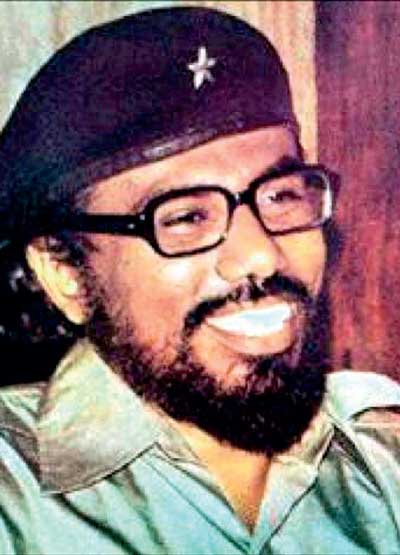 By the time Tyrone wrote this piece in the then published Weekend newspaper, the 1971 insurrection had already had its day and failed; many thousands of our youth were in Police custody or in rehabilitation camps. A countless number of them were killed, tortured and maimed- the most infamous among them was the murder of Premawathi Manamperi in Kataragama. The youth who were roused by the then JVP leader Rohana Wijeweera to work incessantly for the election campaign of the then coalition United Left Front (ULF) led by Sirima Bandaranaike took up arms against the very regime that they helped put in power. It all happened within one year of the ULF assuming office. The conversion from loyalty and reverence to armed confrontation and violent outbreak was visceral.
By the time Tyrone wrote this piece in the then published Weekend newspaper, the 1971 insurrection had already had its day and failed; many thousands of our youth were in Police custody or in rehabilitation camps. A countless number of them were killed, tortured and maimed- the most infamous among them was the murder of Premawathi Manamperi in Kataragama. The youth who were roused by the then JVP leader Rohana Wijeweera to work incessantly for the election campaign of the then coalition United Left Front (ULF) led by Sirima Bandaranaike took up arms against the very regime that they helped put in power. It all happened within one year of the ULF assuming office. The conversion from loyalty and reverence to armed confrontation and violent outbreak was visceral.
In addition, the romanticism that was associated with the 71 Insurrection was magical for the nation’s rural youth for whom a promise of a ‘communist-socialist utopia’ was far more appealing and intoxicatingly attractive than a gradual evolution from capitalism to socialism, as was preached by the then traditional left-wing parties led by N. M. Perera, Pieter Keuneman and Colvin R de Silva. That romanticism which was woven into the lives of the Podi Athulas, and Bopages of the ’71 Insurrection continued its course well into the second revolution of ’87-’89 with ‘freedom-fighters’ like Saman Piyasiri Fernando- the real person behind the Keerthi Wijayabahu fame- and those dozens of JVPers such as H B Herath, Upatissa 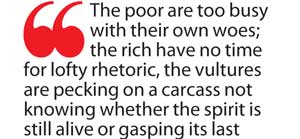 Gamanayake and Shantha Bandara who perished under police brutality and interrogations in dark cells of the ‘Dharmadeepaa’ called Sri Lanka.
Gamanayake and Shantha Bandara who perished under police brutality and interrogations in dark cells of the ‘Dharmadeepaa’ called Sri Lanka.
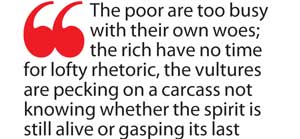 These flirtations with an abstract notion of revolution aside, a critical analysis of the performance of the JVP would reveal a dreary picture of a political party that is seemingly grounded on populist policies yet acutely lacking in popular support among the broad masses that are still tending towards conventional and traditional politics- the very political philosophy of the JVP looks more like an infatuation that the youth nurtures during their adolescent years rather than a sustained commitment to a political school of thought. When describing a revolutionary, Castro of Cuba proclaimed thus: “there are only three places for a revolutionary to find himself in: 1) on the battlefield, 2) in a cell or 3) amongst the dead. While his loyalists and armed cadres were on the battlefield, the leader of the JVP, on both occasions- 1971 and ’87-’89- was MIA (Missing In Action).
These flirtations with an abstract notion of revolution aside, a critical analysis of the performance of the JVP would reveal a dreary picture of a political party that is seemingly grounded on populist policies yet acutely lacking in popular support among the broad masses that are still tending towards conventional and traditional politics- the very political philosophy of the JVP looks more like an infatuation that the youth nurtures during their adolescent years rather than a sustained commitment to a political school of thought. When describing a revolutionary, Castro of Cuba proclaimed thus: “there are only three places for a revolutionary to find himself in: 1) on the battlefield, 2) in a cell or 3) amongst the dead. While his loyalists and armed cadres were on the battlefield, the leader of the JVP, on both occasions- 1971 and ’87-’89- was MIA (Missing In Action).
Rohana Wijeweera was in the Jaffna prison during the former, ’71 fiasco, and living a cushy life of a landed proprietor on a tea estate in the cool climates of the hill country in the latter. No amount of political spinning would turn statistical truths into delusional innuendos. Despite a wide-ranging appeal 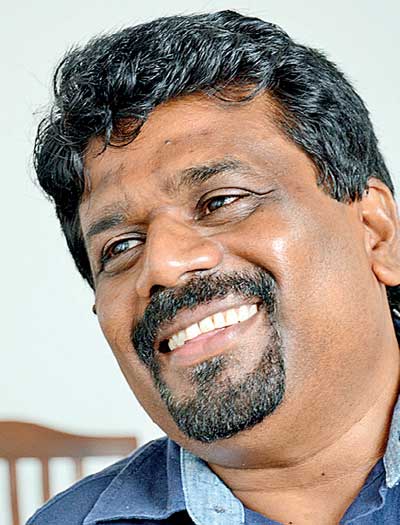 of the message- as one of honest, hard-working and committed- the voting public time and time again rejected them at the polls. JVP’s path to power is definitely not through the ballet. Dreaming of a national consensus for power for the JVP in a democratically elected parliament is an illusion, a mirage that recedes before one’s eyes before it even materialises.
of the message- as one of honest, hard-working and committed- the voting public time and time again rejected them at the polls. JVP’s path to power is definitely not through the ballet. Dreaming of a national consensus for power for the JVP in a democratically elected parliament is an illusion, a mirage that recedes before one’s eyes before it even materialises.
Nevertheless, the vibrancy and vitality the JVP has rendered towards Sri Lanka’s polity in the past three decades continues to bewilder many a pundit. Its spiritual power, its message of honesty and integrity and the extraordinarily magical oratory of their leaders from Wijeweera down to Anura Kumara Dissanayake never cease to mesmerise a public who, when confronted with a choice from amongst alternative governing parties, time after time have chosen to disregard and reject them totally at the polls. JVP was gifted with leaders of unmatched oratorical skills. The mastery of Wijeweera’s speechifying, Gamanayake’s and Bopage’s surgical analysis of sociopolitico- economic issues are amongst the best presentations on public political platforms.
It was only R Premadasa who could be ranked above Wijeweera in public speaking. And Premadasa’s ability to reduce a very complex sociopolitical issue to simply comprehensible alternatives made him a powerful public speaker yet unmatched. Let us look into the JVP’s performance at the elections in which they were participants. The following table of statistics shows the JVP’s distressing tale: Note: 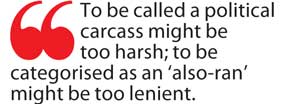 The anomaly in 2004 is due to the JVP not contesting on its own as a separate political party but as a constituent party of the United People’s Freedom Alliance (UPFA).
The anomaly in 2004 is due to the JVP not contesting on its own as a separate political party but as a constituent party of the United People’s Freedom Alliance (UPFA).
Now let’s look at their Presidential Election results: The current leadership of the JVP would not like them. They are not pretty to look at! The total poll in 1982 was 6,602,617. In 2015, it reached 11,684,098, while the JVP vote bank as a percentage of the total polled, more or less, remained the same- 4.1% to 4.8%. A remarkable lack of improvement! In the context of elections, the mindset of the country’s electorate has not changed since the formation of the Sri Lanka Freedom Party (SLFP) in 1951.
The voter is doggedly wedded to either of the two mainstream parties- UNP and SLFP.It is depressing to observe that, in spite of wide publicity the JVP speakers receive, both in the mainstream and social media, when it comes to votes, the electorate seems to be astonishingly reluctant to place trust in them and their policies. In War and Peace, Tolstoy wrote: “A man on a thousand mile walk has to forget his goal and say to himself every morning, ‘Today I’m going to cover twenty-five miles and then rest up and sleep”.
Today’s JVP leaders may well be advised to borrow a hint from Tolstoy and take stock of their political strategy. They must come to terms with the ultimate goal of all politics- gaining power, either as one single entity or as a part of a coalition. No political party worthy of serious consideration by a majority of the electorate, can choose to be content being spectators. Or are they following the ancient wisdom of Plato who said that: “One of the penalties for refusing to participate in politics is that you end up being governed by your inferiors.”?
Whichever way one chooses to read the current plight of the JVP, the intellectual would feel thoroughly depressed, the poor man’s anxieties would linger on and wheeler-dealer politicos would invariably turn their backs on a generational cry and encourage the electorate to carry on regardless of the unsustainable status quo that the JVP has been fighting against. The distrust that the JVP is having with the UNP is beyond repair; it is one of doctrinaire genre rather than about personalities and tempo.
They have been betrayed by the traditional left-wing parties, including the SLFP. Minorities mistrust them and the majority has no faith in them. Caught among these unforgiving horns of mutually-antagonistic forces, the revolutionary movement that created political tremors in the 1971 and ’87-’89 periods, however, reached into its depths and worked for the defeat of Mahinda Rajapaksa in January 2015. That alone would have justified their existence as a political force. To be called a political carcass might be too harsh; to be categorised as an ‘also-ran’ might be too lenient.
Yet, each time when one overhears the resounding voice of Anura Kumara Dissanayake, the current JVP leader who is arguably the most accomplished Sinhala orator in the country today, it resonates the anguish of the dreams that were dashed and promises unfulfilled. The poor are too busy with their own woes; the rich have no time for lofty rhetoric, the vultures are pecking on a carcass not knowing whether the spirit is still alive or gasping its last. The parasitical politicos are salivating to devour the political insects that have been flushed out by the searing flames of revolution. The JVP saga is indeed a tragedy of uncommon measure. The writer can be contacted at vishwamithra1984 @gmil.com

Add comment
Comments will be edited (grammar, spelling and slang) and authorized at the discretion of Daily Mirror online. The website also has the right not to publish selected comments.
Reply To:
Name - Reply Comment
US authorities are currently reviewing the manifest of every cargo aboard MV
On March 26, a couple arriving from Thailand was arrested with 88 live animal
According to villagers from Naula-Moragolla out of 105 families 80 can afford
Is the situation in Sri Lanka so grim that locals harbour hope that they coul